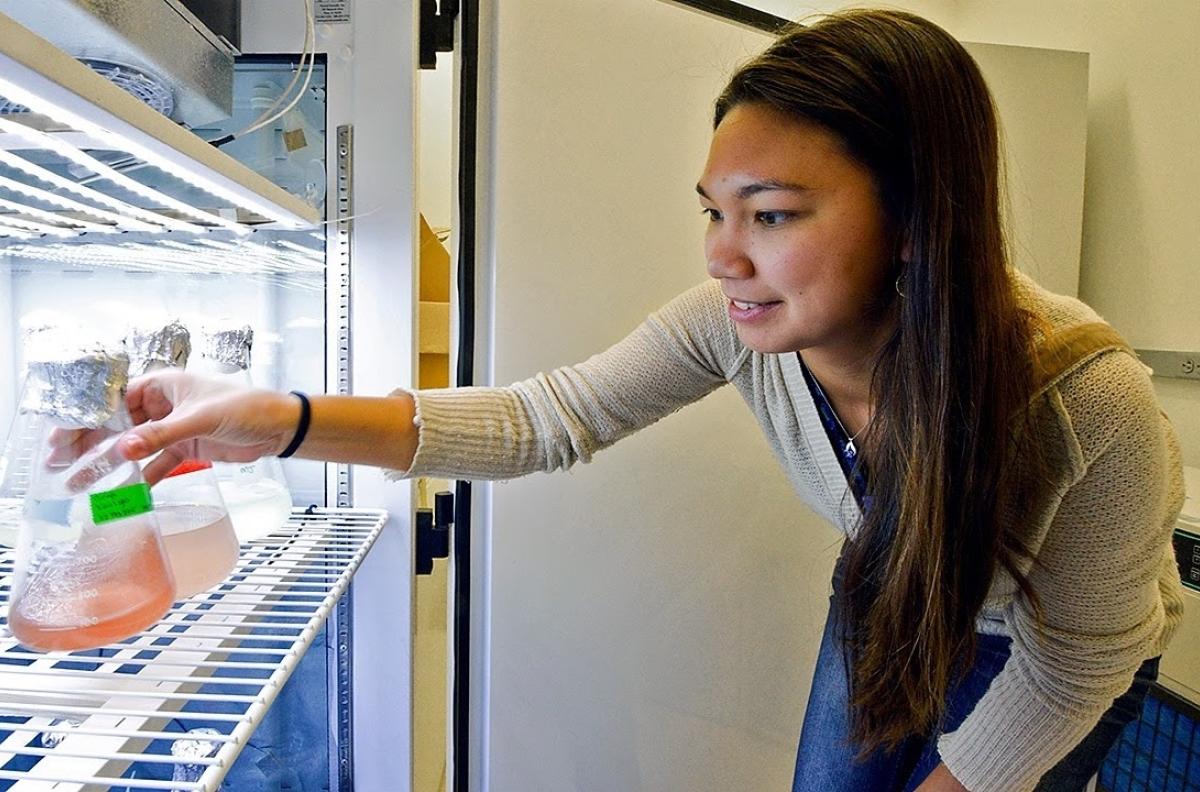
Holly Moeller hopes these nondescript algae will help her uncover the intriguing lifestyle of mixotrophs and understand how environmental conditions influence their growth. Photo Credit: Holly Moeller
In biology, there are organisms that produce their own food and those that must obtain it elsewhere. This distinction between autotrophs and heterotrophs is a familiar aspect of the natural world for most people.
Then there are mixotrophs. “They combine both forms of metabolism, functioning as both plant and animal simultaneously,” explained Holly Moeller, an assistant professor in the Department of Ecology, Evolution, and Marine Biology at UC Santa Barbara. “These are nanoplankton, so even with a decent microscope they mostly look like swimming sparkly dots!”
The National Science Foundation (NSF) has conferred Moeller with a CAREER award to study how these metabolically flexible organisms function and how they are impacted by environmental change. This five-year grant will enable her to expand her lab, which specifically focuses on mixotrophic plankton, to carry out more experiments and to create educational outreach opportunities for undergraduate students and K-12 teachers.
The miniscule mixotrophs the lab studies are omnipresent in the surface of Earth's oceans and lakes, although scientists are just beginning to appreciate their role since it's hard to identify and keep track of what they're doing.
Moeller’s lab has shown that mixotroph evolution can be particularly complicated because it can create a positive feedback loop. “And I don't mean positive like ‘it's a good thing,’” Moeller said, “but rather ‘self-reinforcing.’”
It works like this. The warmer the mixotroph gets, the more it relies on eating food rather than photosynthesizing its own food. When mixotrophs eat, they produce carbon dioxide. “The more carbon dioxide in the atmosphere, the warmer the planet gets, the more mixotrophs eat and so on,” Moeller said. When the team ran their first evolution experiments, they found that evolution could exacerbate this effect. Mixotrophs that had the chance to evolve at hotter temperatures ate even more than ones that hadn't.
Moeller and her team believe they can learn how to predict a mixotroph's evolutionary response by looking at its current biology. Namely, mixotrophs with a lot of metabolic flexibility probably won't evolve as much as those with more constrained life processes. The thinking is that there’s no reason to change at the genetic level if you can just change your behavior and gene expression.
Funding from the CAREER award will enable Moeller and her team to test this hypothesis with metabolic assays and evolution experiments. They plan to pair these with mathematical models to extend their understanding beyond their experimental results. The five-year grant will also support a laboratory technician, two postdoctoral researchers, a dozen undergraduate researchers, and the equipment and supplies they will need to carry out the project.
Moeller wasted no time before sharing credit with her team. “The weird thing about the NSF CAREER award is that it's presented to just one individual, the principal investigator,” she said. “But the fact that it has only my name on it is a misnomer. In reality, the ideas from this grant emerged from years of work on mixotrophs by our team.”
The grant provides almost $40,000 for outreach, which will support efforts to expand math literacy. This includes a seminar course for incoming students who are enrolled in calculus. Moeller aims to bridge mathematical concepts to biological ones and create learning support structures in the classroom.